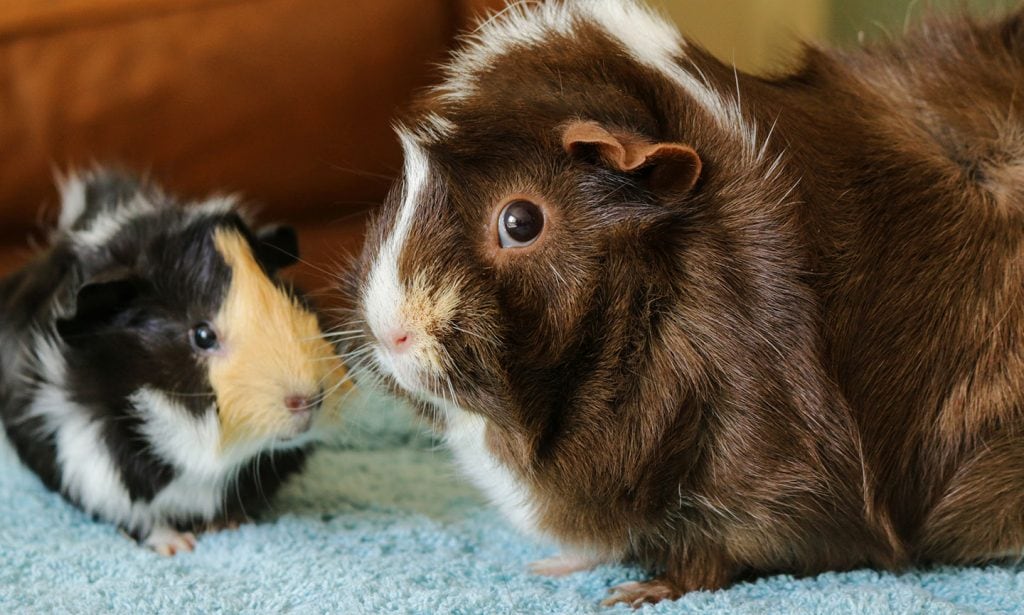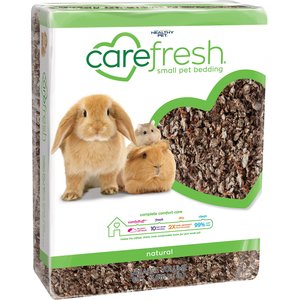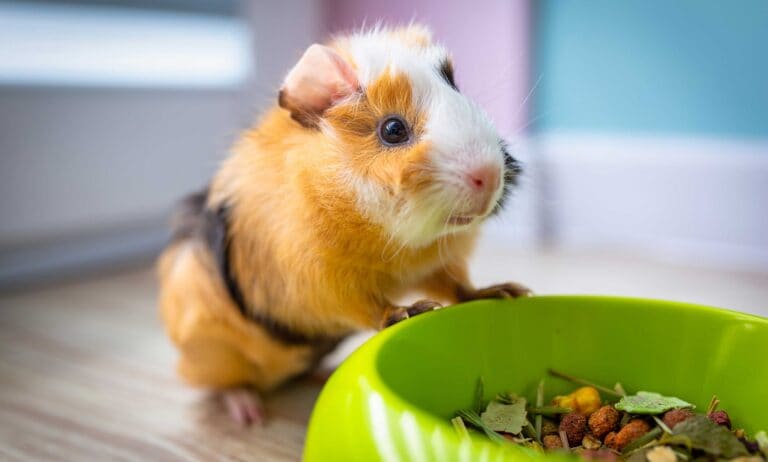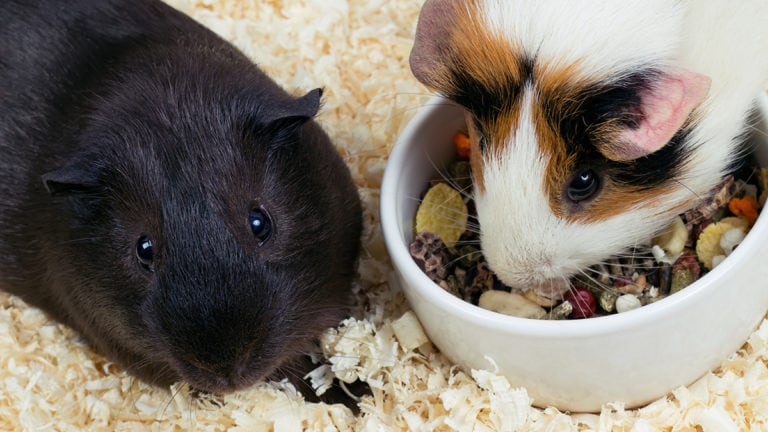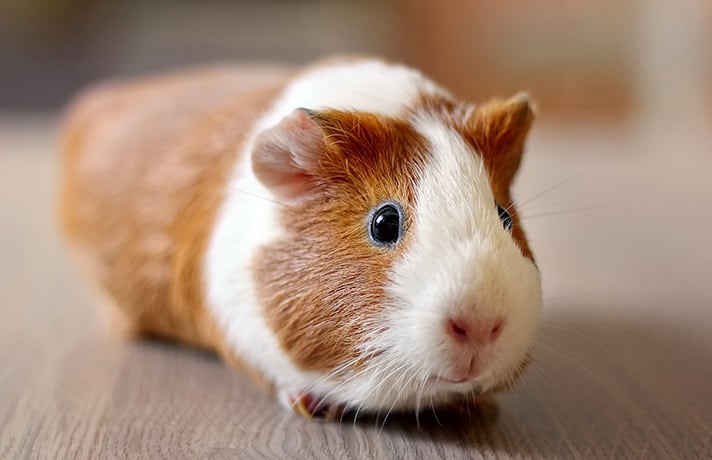Are you anxious because you think your guinea pig may be pregnant? Or maybe her pregnancy is already confirmed and you’re in the dark about what to expect. We spoke to Chewy’s resident exotic pet expert, Dr. Laurie Hess, DVM, about all things to do with pregnancy in guinea pigs. From catching the first signs of pregnancy to knowing what to do if any issues arise, we’ve got you covered.
How Can I Tell If my Guinea Pig Is Pregnant?
If you’re uncertain whether your guinea pig is pregnant or not, don’t worry, you’re not alone. Pregnancy in guinea pigs is pretty tricky to spot. However, there are a few things you can be on the lookout for.
Common signs of pregnancy in guinea pigs include:
- Increase in body weight
- Swollen mammary glands
- Changes in behavior, such as nesting or burrowing in bedding
- Changes in appetite
- Vaginal discharge
It’s important to note that these changes won’t come all at once, but instead will happen over a period of time. In some cases, Dr. Hess shares that you may not realize your guinea pig is pregnant until they begin to give birth. “Until the guinea pigs actually start to show signs of labor, it’s very easy to miss,” Dr. Hess says.
What Age Do Guinea Pigs Reach Sexual Maturity?
A female guinea pig, or sow, can become pregnant as early as two to three months of age. “If you have baby guinea pigs together, you have to separate them,” stresses Dr. Hess. “They don’t discriminate and will breed with their siblings.”
How Long Is a Guinea Pig Pregnancy?
Guinea pigs typically have a gestation period between 59 to 72 days, averaging 68 days. In general, a guinea pig pregnancy will last just a little over a couple of months.
If you suspect your guinea pig is pregnant, it’s essential to make an appointment with your vet as soon as possible so they can help give you a more accurate timeline of how far along your guinea pig may be in her pregnancy.
How Can I Prevent My Guinea Pig from Getting Pregnant?
Spaying and neutering may be most associated with dogs and cats, but did you know that you can have your guinea pig spayed or neutered, too? Not only can spaying and neutering help prevent pregnancy (and the complications and risks associated with it), but it can also lower the risk of certain diseases and conditions common in guinea pigs, such as ovarian cysts.
“Just like women, female guinea pigs can get cysts on their ovaries,” says Dr. Hess. This condition is detrimental to their health. “Hormone surges occur with this condition, and they can lose their hair,” Dr. Hess explains. “Their bone marrow may also become suppressed since hormones affect the ability to make red blood cells.”
If you have a male and female guinea pig living together, Dr. Hess says that typically the male guinea pig will be the one that gets the sterilization surgery, which is less invasive for males than for females.
How should I care for my pregnant guinea pig?
As with humans, pregnancy is also a big life event for guinea pigs. Take these steps to better support your guinea pig during the pregnancy process:
Visit Your Vet
One of the first things you should do if you suspect your guinea pig is pregnant is take them to the vet.
“A vet can take an X-ray or do an ultrasound, just like with a pregnant woman,” Dr. Hess says. Vets can also give a professional estimate of how far along the babies are so you know what to expect throughout the pregnancy. “If time passes and the babies aren’t born, then you know you have a problem,” she adds.
Feed a Healthy Diet
A good diet is also key. Dr. Hess says that the recommended diet for guinea pigs is a small amount of solid food (pellets) formulated specifically for guinea pigs and that are vitamin C-enriched.
Important note: When it comes to diet it’s vital that all guinea pigs have vitamin C regardless if they are pregnant. “Guinea pigs don’t make vitamin C, so whether they’re pregnant or not, they have to be on a vitamin C supplement,” explains Dr. Hess.
Besides nutrient-enriched pellets, Dr. Hess stresses that all guinea pigs should be given “free choice,” or as much as they want, of hay.
The following types of hay should be fed based on needs:
- Timothy hay: Timothy hay is recommended for adult guinea pigs that are not growing, breeding, lactating, or producing milk.
- Alfalfa hay: If your guinea pig is young and growing, pregnant, or lactating, Dr. Hess recommends alfalfa hay. “Alfalfa hay is much higher in calcium and proteins,” she explains. “These are really important staple nutrients in pregnant or lactating guinea pigs.”
Provide Proper Bedding
Although no special bedding is needed for pregnant guinea pigs, Dr. Hess does say it's important that you always use non-toxic bedding. “I’m a big fan of paper-based bedding because it’s non-toxic if they eat it,” explains Dr. Hess. Paper bedding is also easy for guinea pigs to dig and burrow in.
“For paper-based bedding, some people use newspaper because it’s non-toxic, while some people like fancy, colorful paper-based bedding,” she adds. “It depends on what you’re looking for, but paper-based bedding is the best way to go.”
Bedding that should be avoided includes:
- Dusty bedding: Guinea pigs have sensitive respiratory tracts, so it’s best to steer clear of bedding that creates dust.
- Wood shavings: Although wood blocks are often given to guinea pigs to chew on, Dr. Hess says wood shavings should not be used for bedding. Firstly, wood shavings often have fragrant cedar or pine oils on them, which can irritate a guinea pig’s respiratory tract. Secondly, it’s easy for guinea pigs to accidentally eat the shavings (unlike the wood blocks) and wood is not digestible. “If you’re a guinea pig, and you accidentally eat a little bit of wood, it can get stuck in your system and obstruct your gastrointestinal tract,” she explains.
What should I do when my guinea pig gives birth?
So, the big day is here—now what? Labor, similar to the process for humans, can take a lot out of a guinea pig. Because of this, Dr. Hess recommends calling your vet when the time comes. Not only is a vet more experienced, but they can also give you invaluable advice. “There’s a whole host of things you can learn from a veterinarian,” Dr. Hess says. And they may even recommend you come in if there are any concerns.
Common labor signs include:
- Straining
- Vocalizing
- Mucusy or bloody discharge
- Changes in the pelvic area: A guinea pig’s pelvic bones are fused before giving birth. When the birthing process begins, hormones cause the pelvis to relax and separate. This usually begins to happen a couple of days before labor.
What is the typical litter size?
The typical litter size is between two and four guinea pig babies, called pups. Note that this number varies.
How should I care for newborn guinea pigs?
Good news—if the guinea pig is an attentive mom, you can often leave the pups alone to nurse, and they should be fine. You can expect them to nurse from their mother until their weaning age, which is around 3 weeks of age.
If you notice the pups aren’t nursing, or if you have a runt in the litter, don’t panic—however, they most likely will need supplements. In this case, you can use hand-feeding formulas that you can pick up from your local vet. It’s also important to note that newborn guinea pig babies must be kept warm.
“They’re not born independent, so they need some interaction in the beginning,” says Dr. Hess. “But, again, if you notice your guinea pig is giving birth, whether the babies are doing great or not, it’s always good to have contact with a vet.”
How can I tell if something has gone wrong during birth?
Unfortunately, pregnancy complications can occur in guinea pigs, also. This can include:
- Dystocia: “Dystocia is a fancy name for having problems while giving birth,” explains Dr. Hess, such as when a pregnant sow runs into issues during labor because her pelvic canal is too small and her babies are too large.
- Pregnancy toxemia: Pregnancy toxemia, or pregnancy toxaemia, can occur anywhere between two weeks before pregnancy and up to two weeks after birth. “It’s very complicated, but the idea is that the pregnant guinea pig is not getting enough calories,” explains Dr. Hess. “There’s such a demand from the fetuses that the fetuses are sucking all the energy from the mother, so she can’t actually give birth.”
Pregnancy complications are more common in guinea pigs who are:
- Living with obesity
- Pregnant with multiple large babies
- Not getting a good diet to begin with
- Stressed
- Very hot
- Giving birth for the first time
- Over 7 months of age
Heads up: If labor complications occur, a guinea pig may need to be brought into surgery for an emergency C-section.
What's Next After Your Guinea Pig Gives Birth:
Share:
